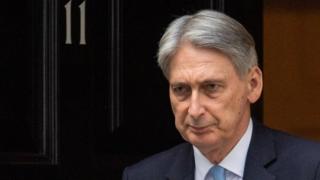Philip Hammond: Proroguing Parliament would be 'shocking'
 Image copyright
PA Media
Image copyright
PA Media
Philip Hammond has said it would be "shocking" if the House of Commons was sidelined by a government who wanted to push ahead with a no-deal Brexit.
The chancellor told the BBC that he was "confident" the Commons will "find a way" to block a no-deal exit.
Conservative leadership contender Boris Johnson has said he could not "envisage the circumstances" in which proroguing - suspending - Parliament would be needed.
His rival Jeremy Hunt has ruled it out.
Conservative Party members have begun to vote on which man they would like to be party leader and the UK's next prime minister. The result of the vote will be announced on 23 July.
Speaking on Nick Robinson's Political Thinking podcast, Mr Hammond said: "It would be frankly rather shocking if the House of Commons - the elected representatives of the people - could be simply sidelined by a government that was doing something that was the exact opposite of what the House of Commons clearly wanted done."
He said the Commons had been "clear" that it did not support a no-deal exit.
He will continue to argue against no deal as a backbencher, he said.
"Our economy will suffer a short-term shock and then in the long term will be permanently smaller than it will otherwise have been," Mr Hammond said of a no-deal Brexit.
'Fiscal headroom'
When previously asked whether he would prorogue Parliament to stop MPs blocking a no-deal Brexit, Mr Johnson has said: "I'm not attracted to the idea of a no-deal exit from the EU but, you know, I think it would be absolutely folly to rule it out. I think it's an essential tool of our negotiation.
"I don't envisage the circumstances in which it will be necessary to prorogue Parliament, nor am I attracted to that expedient."
When asked, Mr Hunt completely ruled out the move.
On the two candidates' spending pledges - and their references to using the £26.6bn "fiscal headroom" to fund some of those promises - Mr Hammond said there was some additional spending power available.
But he said provided there was an "orderly exit of course, it will be possible to do some of the those spending promises - but not all of them".
"No deal means we will have to spend the money, but not in a discretionary way," he said.
"We will be forced to spend it on protecting businesses and industry and households on what is likely to be a surge in inflation."